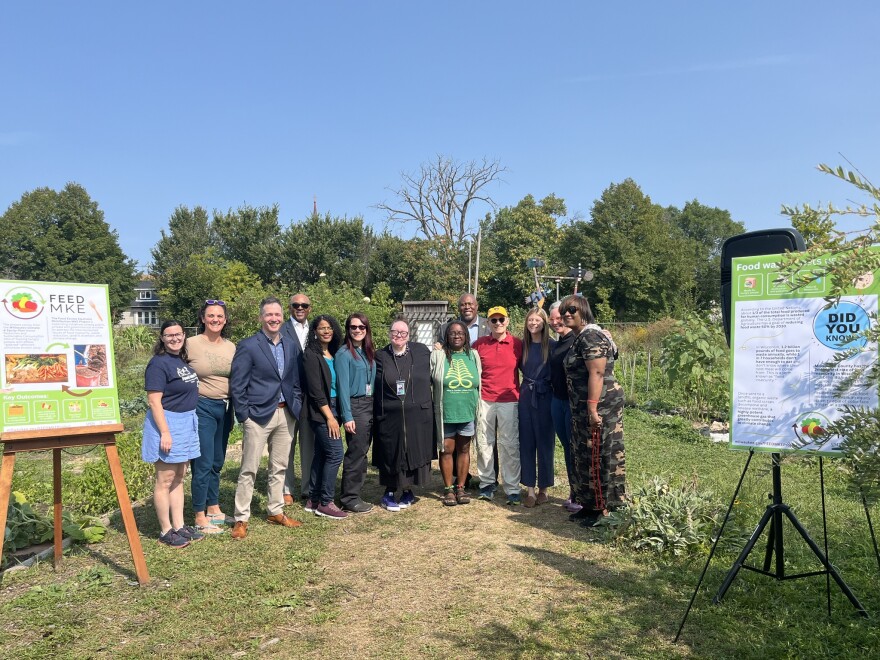A new city program just launched with the goal of tackling the interconnected challenges of food waste, food insecurity, and climate change in Milwaukee. FEED MKE — short for Food Excess, Equitable Distribution — is accepting grant proposals now for efforts to improve food waste recovery and composting. The program aims to build relationships between gleaners and food pantries, restaurants, community organizations, and more to redistribute food that would otherwise be wasted.
“The FEED MKE pilot project offers our city the opportunity to strengthen our economy by reducing waste, addressing hunger, and building programs that inspire hope,” said Mayor Cavalier Johnson in a statement.
According to the Wisconsin Department of Natural Resources, each year, 1.2 billion pounds of food are wasted across the state, while one in seven Wisconsinites experience food insecurity. In Milwaukee, 15% of landfill-bound waste is edible food. There, organic waste decomposes to produce methane, a potent, planet-warming gas.
The program is born of the FEED MKE Coalition, which formed during the drafting of Milwaukee’s Climate and Equity Plan. Community members interested in getting involved are invited to join the growing coalition.
The pilot program is made possible by a two-year, $400,000 federal grant, with funding from President Joe Biden’s landmark climate change bill, the Inflation Reduction Act. Grant proposals will be accepted through Nov. 22. More information on applying for the grants can be found on the program website.
I spoke with Andi Sciacca, who leads the new program from Milwaukee’s Environmental Collaboration Office.
This interview has been edited for length and clarity.
What do we know about how much food is wasted — and the impact of that — in Milwaukee and Wisconsin?
Wisconsin is definitely on the higher end of food insecurity in the United States. Globally, it's a massive issue. On average, the amount of food that we waste exceeds 40% — and in some areas, even 50% — of what is produced. Post-pandemic, 17% of Milwaukee residents are experiencing food insecurity on some level. And yet we waste astronomical amounts of food.
So, the question is, how do we get the most amount of food to the people who need it, and how do we keep the most amount of organic waste from sitting in a landfill? Anyone who's concerned with climate understands that methane gasses are released.
The other piece of it is what we do with what we cannot use. Of course, that's where composting comes in, so that we can continue that cycle of creating healthy and nutritious food, getting it to the people who need it, capturing what we can from the waste, and then putting it back into the soil to create a more healthy ecosystem.
Can you talk about some of the big community connections that you're hoping to make through FEED MKE?
We want to have a coalition that's representative of the entire food system. And there's a lot of areas where we've identified gaps. One great example is the connection between food pantries and composting and grocery chains. Let's say I have a pallet of tomatoes. I'm a grocer, and I don't want to toss them, and I know that there's hungry people, so I take them to the local food pantry. Food pantries are often run by volunteers, and getting a pallet of tomatoes that are near the end of their prime period can be difficult: How do you process them? How do you make use of them?
In some cases, what pantries receive may be suitable only for discard or composting, but unless that food pantry has a compost facility or even a compost bin, that's another wasted opportunity.
So while we're doing this comprehensive study [at the program start], we're saying, okay, maybe we just need this solution to try and address this part of the problem. And then this other part of the problem that we know exists could be more readily addressed through increased funding or having that person who's an innovator and wants to help launch a business solution that would support that goal.
It sounds like FEED MKE is looking at stakeholders at different scales, whether it's businesses or the food pantries, growers. And then there's also ways for individuals to get involved, right?
Individuals are always welcome at the coalition conversations. And there'll be courses online, there'll be workshops. There's a growing list of folks who are offering volunteer opportunities, donation opportunities, or providing resources for folks who are in need. Our website is up, and we've got a lot of early engagement points there for people.
If you're a large-scale organization, like a hospital or a hotel, you can certainly work with us to create better solutions for how you're capturing food waste. We are looking to connect with anyone who has an interest in sharing in the conversation with us. I think just even helping people know what's being done and how we can amplify that — how can we better support the groups who are doing really good work in this area already, and how can we help them collaborate in more meaningful ways? So that there's not a duplication of effort and so that folks aren't struggling to find a model, if a model exists.
Editor's note: A previous headline introduced Andi Sciacca as a chef. While Sciacca previously served as a dean at the Culinary Institute of America, "teacher" more accurately describes her past work.






